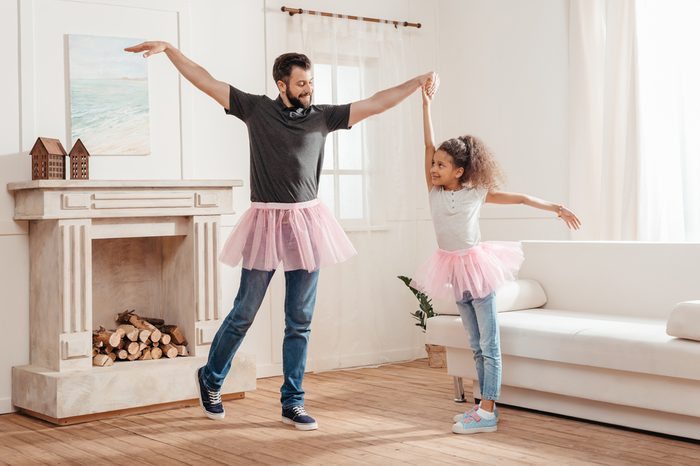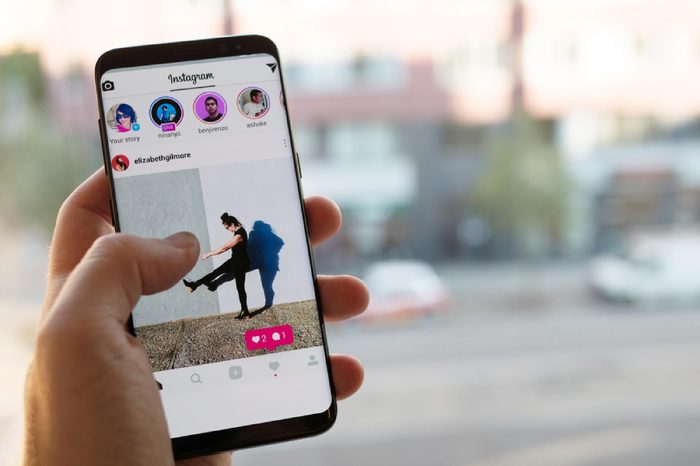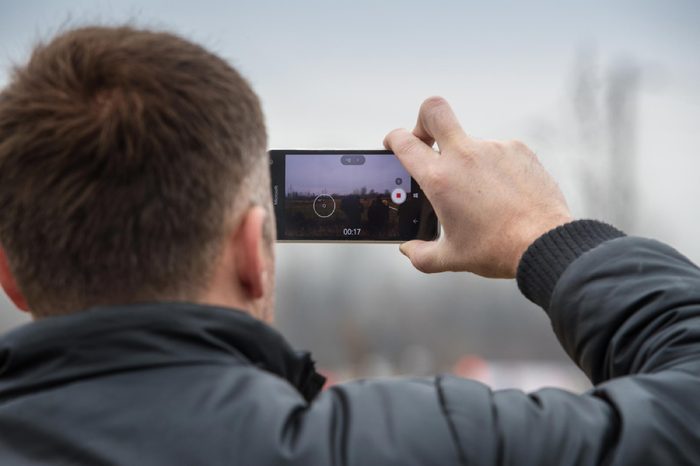
Sharing a funny picture online
Love that funny meme that’s been going around? Resist the temptation to share it on your Facebook or Instagram, as taking pictures from the internet and posting them to your blog or social media can open you up to a copyright lawsuit, says Tanisia Nicole Moore, a virtual intellectual property lawyer at Moore Legal Solutions, LLC. “We are all guilty of sharing an image online, but what most people don’t realize is that these images are protected through copyright law,” she explains. “The owner of the image can then sue you for using their work without permission.” This is true even for images that don’t have a watermark or visible copyright symbol or were posted years ago, nor does it matter if you weren’t the original person to share the image. These online-sharing copyright lawsuits have exploded in recent years, and any person who posts any picture or video they don’t personally own is vulnerable to getting sued for thousands of dollars for a goofy cat picture they posted ten years ago.
Protect yourself: Only post your own pictures or videos that you’ve taken yourself with your own equipment or purchase an image from a reputable stock photo site. And whatever you do, stop passing on funny pictures or videos others send you and immediately delete any existing on your social media accounts, even if they’re years old. Check out these bizarre things that are banned around the world.

Slamming your ex on Facebook
You may think you’re just venting to friends by sharing sordid details about an ex lover or friend on Facebook, but if there’s any part of what you’re saying that might not be 100 percent true, the law sees it as “defamation”—and you can be sued for it, says Paul H. Cannon, attorney and shareholder at Simmons and Fletcher, PC. “Social media has become such a common part of life that people forget that anything you write on social media is a publication, so if you write a false statement about someone online and it causes them harm to their reputation or financial loss, you can be sued for libel,” he explains. It’s true: In 2012, a Texas couple was awarded 13.8 million dollars after someone defamed them online.
Protect yourself: “As hard as it is, the best way to avoid a slander or libel lawsuit is to keep your criticisms to yourself,” he says. Or if you have to vent, don’t do it in writing and especially not online.

Leaving a bad Yelp review
If you’ve ever had a bad experience at a business your first instinct may be to go online and share all the dirty details. On one hand, this can help you get the problems resolved and help other customers avoid getting taken for a ride by unethical business owners. But this can also open up innocent businesses to undeserved hate and loss of revenue.”As humans, we sometimes have a tendency to get outraged when we do not think we have been treated fairly. This can lead to embellishment of what really happened,” Cannon says. “However you may find yourself sued for libel if you leave a very bad review.”
Protect yourself: Before hitting “submit” on your diatribe, ensure that all the statements you make about a company are verifiable facts that you can prove rather than your opinion about the company, Cannon says. If you must share your opinion, preface it by saying “in my opinion,” he adds. These are the books you never knew were banned.

Getting hit by another driver
Think that because you’ve got basic car insurance you’re good? You may be meeting the requirements of the law but you may still be vulnerable to lawsuits if you don’t carry enough “underinsured motorist” coverage. Ironically, you can end up being sued by creditors if you’re in an accident caused by another driver who has no or not enough car insurance, says Andrew Winters, personal injury lawyer with Cohen & Winters, PLLC. If your insurance isn’t enough to make up the difference, you can end up with large out-of-pocket payments that you can be sued over if you don’t have enough money to cover them, he explains.
Protect yourself: Buy at least as much underinsured motorist coverage as you would need to replace ten years of lost wages, he says. For most people this means having an umbrella insurance policy, making sure to select underinsured motorist as part of that coverage.

Posting your kid’s dance video on YouTube
Proud parents gotta post proud videos, right? That’s all well and good, as long as you’re not including copyrighted music—say, in a dance recital, impromptu living room jam session, lip sync battle, stage play, or other popular kid activity, Moore says. You can be sued for stealing intellectual property and, no, posting “I don’t own the rights to this song” with the video or crediting the artist doesn’t excuse you. “I usually chuckle when I see this disclaimer, as this means nothing,” she says. “I know adding music to our videos helps set the mood, but you need to be careful not to infringe on the songwriter’s rights.”
Protect yourself: Don’t use music in your videos, or stick to songs that are considered royalty free, Moore says. You won’t believe these things are banned in the United States.

Putting in a backyard pool
Swimming pools can be a highlight of summertime. After all, who doesn’t love to jump, swim, and dive into the water on a hot day? Unfortunately this is also what makes your pool an “attractive nuisance” to neighborhood children. If a child comes onto your property and is injured or, heaven forbid, drowns while swimming in your pool, you can be sued, says Christopher Earley, a personal injury attorney in Boston. This is true even if you’re not home and you did not give them permission to swim, he adds.
Protect yourself: Keep your pool covered when not in use, surround it with a locked fence, and post “no trespassing” signs.

Selling your crafts online
For hobbyists, the internet is the greatest invention since sliced bread. You can connect with others who share your passion, get tips, and even sell your products—turning your favorite hobby into a profitable side hustle. However, if you’re going to sell things online, be warned that you are in charge of securing and protecting all your customers’ data, even if computers aren’t your thing. “Cyber security is potentially the next big area of lawsuits we’re seeing in the U.S. and abroad,” says Nicholas Dowgul, attorney at Felton Banks, PLLC, in Raleigh, North Carolina. “If you own a website and you do nothing (or not enough) to prevent cyber attacks, you could be sued for negligence if your customer’s data is compromised and they suffer damages as a result.”
Protect yourself: Don’t skimp on online security. Hire a professional to make sure your website is secure or use a service that exists for the purpose of helping people sell things securely online, like Etsy or eBay. You probably never realized these everyday things are illegal.

Asking your coworker about their recent surgery
Workplace banter has become a hotbed of controversy lately and it’s more important than ever to make sure all your comments are kind, courteous, professional, and can’t be misconstrued, Dowgul says. If someone, particularly a subordinate, is offended by something you say, your company may be held liable and, depending on the situation, you could also be personally sued and/or fired, he explains. “You may think it’s nothing more than playful banter or good-natured ribbing but someone else may see it as discrimination or a hostile work environment,” he says.
Protect yourself: Keep conversations with employees cordial and mainly about work. It’s okay to ask someone how their weekend went, but don’t pry into details of their personal life, he says.

Getting married
It’s sad but true: One of the happiest events in your life is also often one of the most common, if not the most common, reasons people get sued. No one wants to think that their true love will end in bitterness but it’s something you need to consider before walking down the aisle. “The fact is that about 50 percent of marriages will end in divorce and most divorces involve a messy lawsuit,” says Paul Mitassov, a lawyer practicing in Toronto, Canada.
Protect yourself: “Prenuptial agreements will minimize your risk exposure,” he says. “Get one.” It’s not the most romantic conversation you’ll have with your fiancee, but it may be one of the most important.

Getting tagged in a picture on Instagram
“Social media is the new ‘paper trail’ and the worst part is most people don’t even realize they are making one,” says Nicole Sodoma, family law attorney and Managing Principal, Sodoma Law. What may seem like a fun vacation pic with your new love can give a lot of unintentional information like your location, clues to your wealth, and your current relationship status—all of which can be used to sue you, she explains. “For example, posting a cute picture with your girlfriend to Facebook before your divorce has been finalized can result in an ‘alienation of affection’ lawsuit, impact an alimony claim, hurt settlement negotiations, and much more,” she says. This is true even if you don’t post the picture yourself, like when a friend tags you without your knowledge.
Protect yourself: It’s tough in this age of oversharing but ideally take a social media break for anything personal, she says. And, don’t forget that text messages and emails are considered evidence too.

Tagging someone else in a picture on Facebook
From a legal standpoint, social media is the source of all evil these days. Not only can getting tagged in a picture open you up to a lawsuit but so can tagging others, says Kevin Adkins, attorney with the Kenmore Law Group. “Many people may post a slew of photos to their Facebooks or Instagrams and tag everyone in them but if you don’t have their permission you can get hit with a lawsuit,” he explains. Everyone has “the right of publicity,” so if you produce or share their likeness without their permission, or post pictures of them in a way that gets them in trouble (like tagging a picture of a friend drunk at a party, which causes them to get fired from their job), they could sue you.
Protect yourself: Always ask for permission before you tag someone in a picture, he says. Or, better yet, don’t tag anyone and tell people to tag themselves if they like. For a lighthearted take, check out these 19 serious court cases with hilarious names.

Taking a video at the park
When something scary, interesting, or upsetting happens, your first instinct may be to pull out your phone and start recording the scene. Unfortunately these videos may be illegal and open you up to a lawsuit, says Thomas J. Simeone, lawyer with Simeone & Miller, LLP, in Washington D.C. “People take videos all the time these days and routinely include strangers or unsuspecting people in the content, but if you live in a ‘two-party’ state you must have permission to record a conversation or else you could be sued, even if the recording was inadvertent,” he explains. “This includes not only videos taken in public, but also security camera [footage].”
Protect yourself: Don’t record people without their permission; and when making a video be careful not to include bystanders.

Walking your dog
“Many people believe that if their dog has never bitten anyone in the past, they cannot be liable the first time that it does, which is a myth,” says Simeone. In most states, if your dog previously displayed any aggressive or violent tendencies, such as barking at strangers and cars—which nearly all dogs do—that could make you liable for a later dog bite, he explains.
Protect yourself: Always keep your dog on a tight leash, he says. If your dog does bite someone, one of the first questions that will be asked is whether the dog was on a leash, as many cities have mandatory leash laws, the breaking of which makes you liable. Even in the absence of such a law, failing to have your dog on a leash can be used to argue that you failed to control your dog and prevent the attack.
